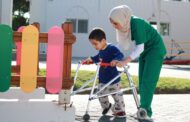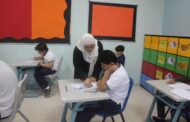Organizations of people with disabilities as inclusive education advocates in Somalia and Uganda
By Colleen Howell, Polly Kirby and Hayley Scrase
Enabling Education Review, Issue 11, 2022 (11) December 2022
For the last three years EENET has assisted members of the Norad-funded Together for Inclusion (TOFI) consortium in Uganda and Somalia to pilot an initiative that develops the capacity of organizations of people with disabilities (OPDs) to promote and advocate for inclusive education. In this article
we outline how OPDs can be effective advocates for inclusion in schools.
The starting point
Since 2015 EENET has worked with Norwegian Association for Disabled (NAD), its partners and ministries of education in Zambia and Zanzibar to develop inclusive education teacher training. From this evolved a desire to support OPDs to play a greater role in inclusive education, as advocates and advisers. Overall, this work is now known as the Inclusive Learning Approach (ILA).
The TOFI program started in late 2019 as a collaboration between 15 Norwegian OPDs and NGOs working in Ethiopia, Mozambique, Niger, Somalia, South Sudan, and Uganda. The program covers human rights, economic empowerment, and inclusive education. ILA has been used in four TOFI countries. It has two components: inclusive education teacher training and inclusive education advocacy.
While ILA’s Inclusive Teaching Component emerged in Zambia and Zanzibar, the Inclusive Advocacy Component was first developed in Uganda, by National Union of Disabled Persons of Uganda (NUDIPU) and NAD with technical support from EENET. It was then adapted in Somalia, involving Puntland
Disability Organization Network (PDON), Save the Children Somalia, Disability Aid Foundation (DAF), and Adventist Development and Relief Agency (ADRA) in Puntland and Central South Somalia, again with EENET support. It is further being adapted in NAD-supported projects in Zambia and Zanzibar.
About the Inclusive Advocacy Component
OPD members have experience of the barriers facing learners with disabilities. Through collaborating with schools and linking them to support in the community, OPDs can help to address these barriers. They can actively lobby governments for changes to policy, plans and budgets. OPDs include adults with disabilities and parents of children with disabilities.
Through awareness-raising among members, they can mobilize more support within communities for inclusive education. TOFI provided an ideal opportunity to pilot inclusive education-focused mentoring and professional development for OPDs.
The Inclusive Advocacy Component strengthens OPDs’ understanding of inclusive education situations and opportunities in low- resource contexts. This helps OPDs develop a clear vision of the changes they want to see in their education system. It also facilitates stronger engagement with schools and various levels of education authorities.
The approach has the following ambitions
– OPD members gain deeper knowledge and understanding of inclusive education and use this to support the development of inclusive schools and monitor progress.
– With improved knowledge, OPDs develop more refined and evidence-based policy advice and guidance, and use this to advocate for inclusive education at different levels.
– In turn, OPDs develop tools to integrate inclusive education awareness raising and monitoring into their strategic planning for inclusive education.
Type of training
OPDs often lack access to practical change- focused training on inclusive education, and not much existing training is free or open-source.
The capacity building process in Uganda and Somalia therefore involved developing four training modules that will be freely available:
Foundational module: Introduction to inclusive education: what is inclusive education and understanding inclusive education advocacy?
Module 2: Collaboration for inclusion: Working with School Inclusion Teams and networking across communities for inclusive education;
Module 3: Identifying and supporting out-of- school children and using advocacy skills to do this;
Module 4: Sustaining inclusive education advocacy and integrating inclusive education into strategic plans.
– Each module builds on learning from the previous module and encourages participants to put their learning into practice. Participants do small advocacy tasks within their communities using skills they have learnt, such as action research, in between each training module. This helps them understand more about inclusive education challenges and take positive action in their local context.
– All the modules and advocacy tasks are designed to be adapted to different contexts. In each new context, the four modules need to be read, reviewed and adapted before being used in collaboration with the lead facilitators who are being trained.
Key elements of the approach
– Lead facilitators from the implementing organisations, which should include OPDs, help to contextualise the training materials meaning they are co-developed and therefore co-owned by key stakeholders.
– The approach builds a cadre of knowledgeable, skilled and confident OPD facilitators. They roll out the training to OPD members, community leaders and
– parents/caregivers. They also make ongoing improvements to the training and align it to the local context.
– The training prioritizes practice over theory, promotes learning-by-doing, and builds OPD members’ capacity to be innovative and critically reflective when advocating for inclusive education.
– It recognizes the vital roles OPDs can play in advocating for inclusive education and the skills and knowledge needed for these roles.
– It provides a toolkit and suggestions for how to use, adapt and build on the approach to make it context specific.
Some lessons
Experience from Uganda and Somalia suggests the training should be rolled out fairly quickly after the local-level facilitators have been trained. This ensures the facilitators
are confident and remember the content and methodologies. Facilitators should train in facilitation teams, so they can support and learn from each other, and learn across districts. The facilitators should train OPD leadership and other members; parents of children with and without disabilities from
schools in their communities; head teachers; and local councillors, district and/or community leaders.
Colleen is a lecturer at the Institute of Education in London and an EENET consultant. Polly is an independent consultant in inclusive education. Hayley is Project Co-ordinator at EENET. Contact them through the EENET office. More information about the project: https://bit.ly/eer11-26

























